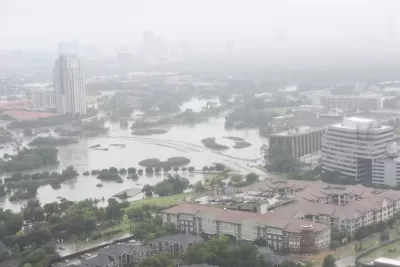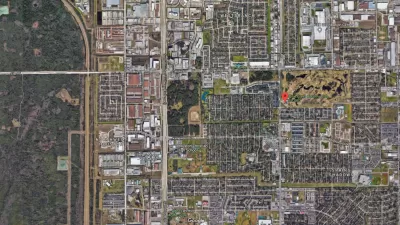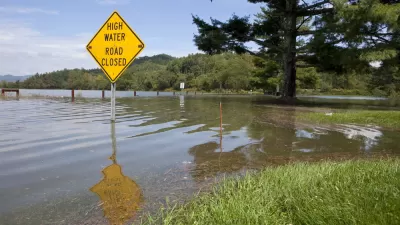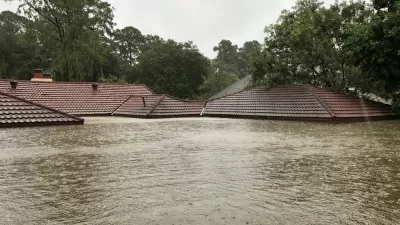It was the city's "first major regulatory response" to Hurricane Harvey.

Last week, in an "unusually tight" vote, the Houston City Council ruled that starting in September, "all new construction in the city’s floodplains will have to be built two feet above the projected water level in a 500-year storm." Under current rules, it's only one foot, and from only the 100-year level.
"The vote marks a shift away from Houston’s longtime aversion to constraining," writes Rebecca Elliot, who also reports that the vote was largely along party lines—as well as supported by the mayor.
Harris County started using the 500- year floodplain in January, but entire region's distaste for regulation has been a popular topic of conversation in the months since Hurricane Harvey, which according to some studies was more like a 1,000-year storm.
It might seem unwise, after Harvey, tokeep building in the floodplain at all, but the city's real estate market barely paused in the wake of the massive storm, and buyers of both new and old structures will still be protected by the National Flood Insurance Program.
FULL STORY: City Council adopts stricter development rules for Houston’s floodplains

Study: Maui’s Plan to Convert Vacation Rentals to Long-Term Housing Could Cause Nearly $1 Billion Economic Loss
The plan would reduce visitor accommodation by 25,% resulting in 1,900 jobs lost.

North Texas Transit Leaders Tout Benefits of TOD for Growing Region
At a summit focused on transit-oriented development, policymakers discussed how North Texas’ expanded light rail system can serve as a tool for economic growth.

Using Old Oil and Gas Wells for Green Energy Storage
Penn State researchers have found that repurposing abandoned oil and gas wells for geothermal-assisted compressed-air energy storage can boost efficiency, reduce environmental risks, and support clean energy and job transitions.

Private Donations Propel Early Restoration of Palisades Playground
Los Angeles has secured over $1.3 million in private funding to restore the Pacific Palisades playground months ahead of schedule, creating a modern, accessible space that supports community healing after recent wildfires.

From Blight to Benefit: Early Results From California’s Equitable Cleanup Program
The Equitable Community Revitalization Grant (ECRG) program is reshaping brownfield redevelopment by prioritizing projects in low-income and environmental justice communities, emphasizing equity, transparency, and community benefits.

Planting Relief: Tackling Las Vegas Heat One Tree at a Time
Nevada Plants, a Las Vegas-based nonprofit, is combating the city’s extreme urban heat by giving away trees to residents in underserved neighborhoods, promoting shade, sustainability, and community health.
Urban Design for Planners 1: Software Tools
This six-course series explores essential urban design concepts using open source software and equips planners with the tools they need to participate fully in the urban design process.
Planning for Universal Design
Learn the tools for implementing Universal Design in planning regulations.
Ascent Environmental
Borough of Carlisle
Institute for Housing and Urban Development Studies (IHS)
City of Grandview
Harvard GSD Executive Education
Toledo-Lucas County Plan Commissions
Salt Lake City
NYU Wagner Graduate School of Public Service





























